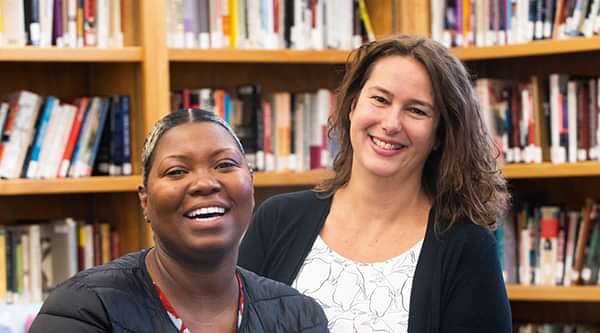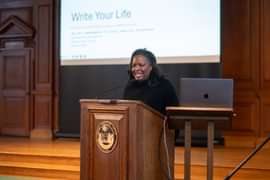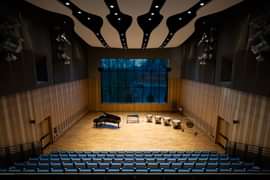
April 06, 2020
Future leaders of a just world
Student programs foster social justice mindsetby Dr. Flavia Vidal & LaShawn Springer
On any given day, students walk into the Office of Community and Multicultural Development’s welcoming space in Morse Hall and find themselves in the middle of a thoughtful conversation about identity and belonging, a planning session for a dorm talk, a meeting of any of the 30-plus clubs, a support circle for a peer struggling with a personal or systemic issue… or they can simply do homework, hang out with friends, or connect with a trusted adult. The same is true of the Brace Center for Gender Studies in Abbot Hall, where young feminists create community and plan gender-related learning opportunities for their peers, embodying the legacy of Abbot Academy.
Through CAMD and Brace, students grapple with hard truths about privilege based on racial, economic, gender, and sexual identity and then articulate what they are willing to do to break down those systems that prevent us from living in a just world. Students build on the powerful histories of their predecessors, who did the work long before terms like equity and inclusion entered the lexicon, who carved out space for young people when they felt like they didn’t belong on our campus, and who challenged Phillips Academy to think about its own mission-centered responsibility to welcome “youth from every quarter.” These enduring legacies have also created an important intergenerational connection between students and alumni. Major events, like AfLatAm@50 and GSA@30, complement more intimate discussions, like those with Abbot alumnae who regularly come back to engage with students.
Students often find their “home away from home” in Brace and CAMD—both the physical spaces and the communities they engender. They feel safe, affirmed, and loved, and this is paramount.
Brace and CAMD are much more than havens for young people grappling with identity issues; in the words of UCLA Distinguished Professor of Education Pedro Noguera, “We will achieve justice when safety and love are systemic.”
We channel our students’ critical inquiry mindsets and passion for social justice into an intentional, ambitious, schoolwide curriculum based on collaboration and coalition building, peer-to-peer pedagogical interventions, and student-driven initiatives. The CAMD staff and Brace advisory boards model this horizontal approach and are integral to our impact.
At the core of our programming is an understanding that we are collectively responsible for one another and the world. Our individual relationships with each other, though very important, do not drive our sense of justice. We are propelled to act by an understanding that we are all actors in a system that necessitates an active, ongoing disruption, lest we become passive participants. This process involves unlearning some of what we’ve been taught and socialized to believe and relearning how to live in a just community.
We are leaders in justice-oriented education not only on campus, but also among our independent-school peers. Brace is the only center for gender studies at the secondary-school level and is an extraordinary asset for Andover, especially given the importance and impact of recent national conversations about sexual assault and gender identity/expression. CAMD too is a model for peer institutions, recognized for its extensive programming, which grapples with power and privilege and prioritizes training for students to be thought leaders and change agents. We are one of only a few schools to engage in a full day of justice-based learning on MLK Day, now in its 30th year.
Our students become intellectual leaders through the CAMD Scholars and Brace Student Fellows programs, which annually select eight to 10 uppers and seniors to embark on extensive summer research on diversity/multiculturalism or gender/sexuality. Guided by a faculty advisor, the students present their findings to the community.
One of this year’s CAMD Scholars recently led a lively discussion about the challenges faced by the children of refugees—in the United States and on campus. And during a standing-room-only Brace Fellow presentation, a student analyzed how traditional gendered expectations affect male choreographers’ visions, resulting in harmful effects on ballerinas’ bodies, and explained how these gendered norms play out in the lives of our student dancers.

Our work impacts the entire Andover community and beyond: MLK Day workshops; symposia on women in economics, reproductive rights, food justice, and data for social justice; publications like Out of the Blue and Into the Blue emphasizing the importance of storytelling as a tool for justice; the annual Take Back the Night march and vigil supporting survivors of gender-based violence; All-School Meeting speakers on disability justice, immigration, youth organizing, formations of masculinity in America, and the 100th anniversary of the 19th amendment; equity and inclusion training for faculty and staff; Reunion Weekend classes; Andover’s first all-gender dorm; and our Summer Gender Institute.
We’ve also extended programming to Andover families, for example inviting them to be in conversation with Tony Jack, assistant professor at Harvard’s Graduate School of Education and author of The Privileged Poor: How Elite Colleges Are Failing Disadvantaged Students. Sharing his story as a first-generation college student trying to navigate the unspoken rules of his institution, Jack provided a validating and affirming voice for students and families, many of whom traverse some of the same challenges at Andover.
CAMD and Brace are proud to ground students’ journeys in safety and love, all the while providing them with the critical mindset and the activist skills that they will need to lead us to a just world.
Categories: Campus Life, Magazine
Other Stories

Best-selling author Rachel Howzell Hall delivers MLK Day keynote




